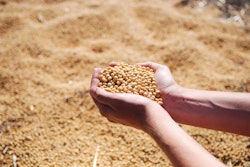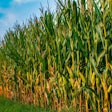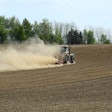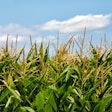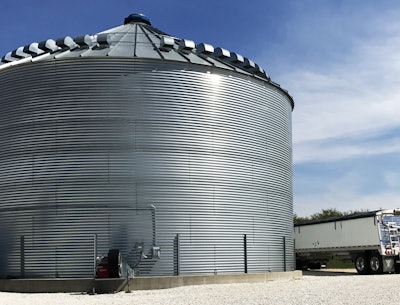
With the arrival of planting season, producers need to regularly check their stored grain in order to prevent spoilage. According to Charles Hurburgh, grain quality and handling specialist with Iowa State University Extension and Outreach, producers need to double the frequency they inspect their grain because this is a high-risk year and the condition of stored grain could deteriorate quickly.
“Pay attention to dew point temperatures in the air,” said Hurburgh, who also serves as director of the Iowa Grain Quality Initiative. “If we have a stretch of big storms, there will often be dry air afterward with dew points in the 30s and 40s. Run fans if the grain is warmer than that in order to keep gain cold as long as possible.”
Humid weather can cause grain storage problems and can become an issue if the grain is not cooled. If the relative humidity is 65 percent or above, fungi and other spoilage organisms can develop. Aeration in storage bins is done to stay below 65 percent humidity in the grain mass, which helps prevent spoilage.
“If the corn is cold, occasionally water will condense on the top of the bins, so having a bin with a roof ventilator is a plus,” said Hurburgh. “If the water has condensed on the roof, take care of it right away with a roof fan and it won’t be necessary to aerate the whole bin with air warmer than it needs to be.”
Last fall was not a good cooling period, as temperatures were warm with relatively high dew points. More of the grain’s storage life was used up, which will mean higher risks this summer. The large carryover means that some of the 2016 crop will need to be in condition even into 2018.
Wet weather is delaying planting in some areas, but a higher moisture harvest is not currently being forecasted.
“A common misconception is if planting season is later, then harvest season will be later,” said Hurburgh. “It’s also a misconception that early planting means early harvest, but there is no real correlation between planting date and having wet corn in the fall. The planting date will have no predictable impact on harvest moisture, at least up to a time corn is likely to be switched out in preference to soybeans. It has everything to do with the weather in August and September.”
For additional information, the Iowa Grain Quality has developed online learning modules to help producers learn proper grain storage practices. The Iowa Grain Quality Aeration Module (CROP 3083B) and Iowa Grain Quality Fan Performance Module (CROP 3083C), produced in cooperation with the Iowa Grain Quality Initiative and Crop Advisor Institute, helps users understand the function of aeration in preventing grain spoilage and how fan performance helps to cool grain, as well as the requirement for fan selection.
Other available modules address grain storage economics, food safety and animal nutrition, supply chain analysis and processing. The modules are free and can be accessed on the Extension Store.



